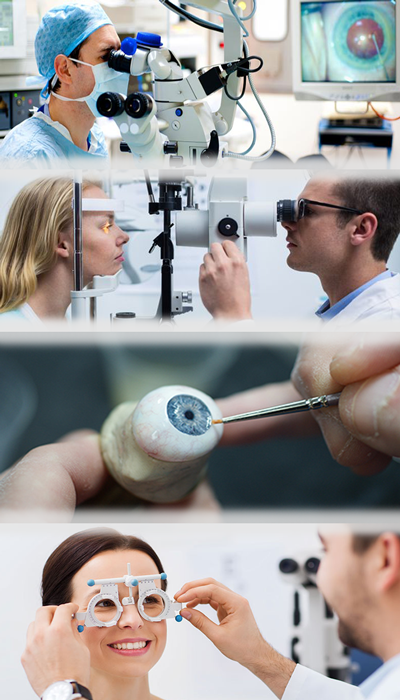The 4 O’s

(Pictured from top to bottom) Ophthalmologist performing surgery, Optometrist examining patient, Ocularist painting an iris, Optician measuring frame width.
Ophthalmologists, Optometrists, Ocularists, and Opticians. Here is what you need to know about each profession and who to go see in certain instances.
OPHTHALMOLOGIST
An ophthalmologist is a highly skilled medical doctor who specializes in eye and vision care. Ophthalmologists either have an M.D. or a D.O. degree and receive special training in all aspects of eye care, including prevention, diagnosis, and medical and surgical treatment of eye conditions and diseases. Ophthalmologists are licensed and credentialed to perform eye surgery, whereas an optometrist is not.
Ophthalmologists are trained to provide the full spectrum of eye care, from prescribing glasses and contact lenses to performing complex and delicate eye surgery. If you are in need or suspect you are in need of eye surgery, an ophthalmologist is the individual you would need to schedule an appointment with.
OPTOMETRIST
Both ophthalmologists and optometrists are involved with the examination of healthy eyes and the diagnosis and treatment of eye diseases. The difference is in the scope of their work. Optometrists do not perform any type of eye surgery, but are trained to detect, diagnose and manage eye diseases that require medical and non-medical treatment. All optometrist should hold a Doctor of Optometry degree (O.D.). A good comparison is that of a General Dentist and an Oral Surgeon, general dentist being the optometrist and the oral surgeon being the ophthalmologist.
In some cases, medical care may be provided by an optometrist and an ophthalmologist working together. In this case, your primary care optometrist will refer you to a specialist, usually an ophthalmologist, for a definitive diagnosis and treatment plan. After the condition is controlled or surgically treated, the ophthalmologist will send you back to your optometrist to continue to monitor and treat your condition as needed. Optometrists will often recommend an ocularist to you if you are seeking out a prosthetic eye or scleral shell. Any health concerns relating to your eye, eye socket, or vision should be directed towards your primary care optometrist.
OCULARIST
Ocularists are skilled artists and craftsmen that are trained in the art of fitting, painting and fabricating custom ocular prostheses. Most ocularists hold a bachelor’s degree of a related skill, often in art or the biological sciences. In order to become certified, ocularists must complete the educational requirements within the American Ocularists Society (A.S.O.) or complete the designated number of hours apprenticing under a certified ocularist. After one of these have been completed, they must take a NEBO written exam and undergo a fabrication exam as well.
Ocularists are trained in crafting custom ocular prostheses as well as educating post-operative patients on how to take care of and maintain their prosthetic eye. Not to be mistaken as doctors, they are solely responsible for crafting and delivering prosthetic eyes to post-op patients and providing long term care regarding the prosthesis. Ocularists are not licensed to diagnose or treat any type of eye diseases.
If you have already had eye surgery, or your primary eye doctor has recommended a scleral shell for you, you will want to get in contact with the board certified ocularist that is closest to you (Find an Ocularist). If you already have an artificial eye, but feel that there might be something wrong with your socket health, then you should go see your primary eye doctor first.
OPTICIAN
Opticians are trained in interpreting and filling prescriptions for eyeglasses that are given to them by an ophthalmologist or optometrist. In some states, opticians may be licensed to fit contact lenses as well. Opticians only require a high school diploma, although many further their education by obtaining a certificate or associates degree.
Opticians fit and adjust glasses or contact lenses according to prescriptions and customer specifications. They usually recommend specific eye wear and teach customers how to wear and maintain glasses and lenses.
If you wear eyeglasses or contact lenses and need help in adjusting the frame or fit, an optician is the person you will need to talk to. If you would like to have you vision reassessed, then you must go to an optometrist first before visiting an optician. Luckily, opticians usually work within the same practice as an ophthalmologist or optometrist.


